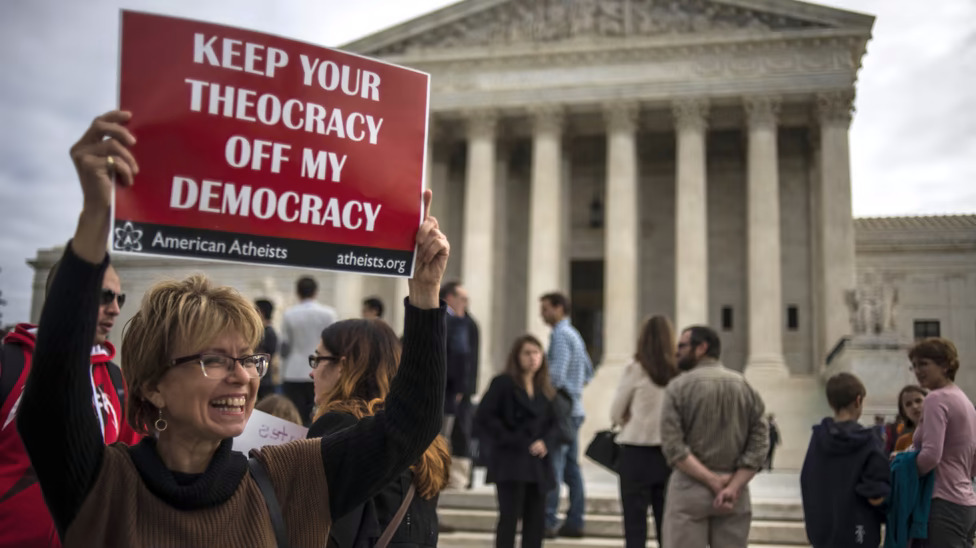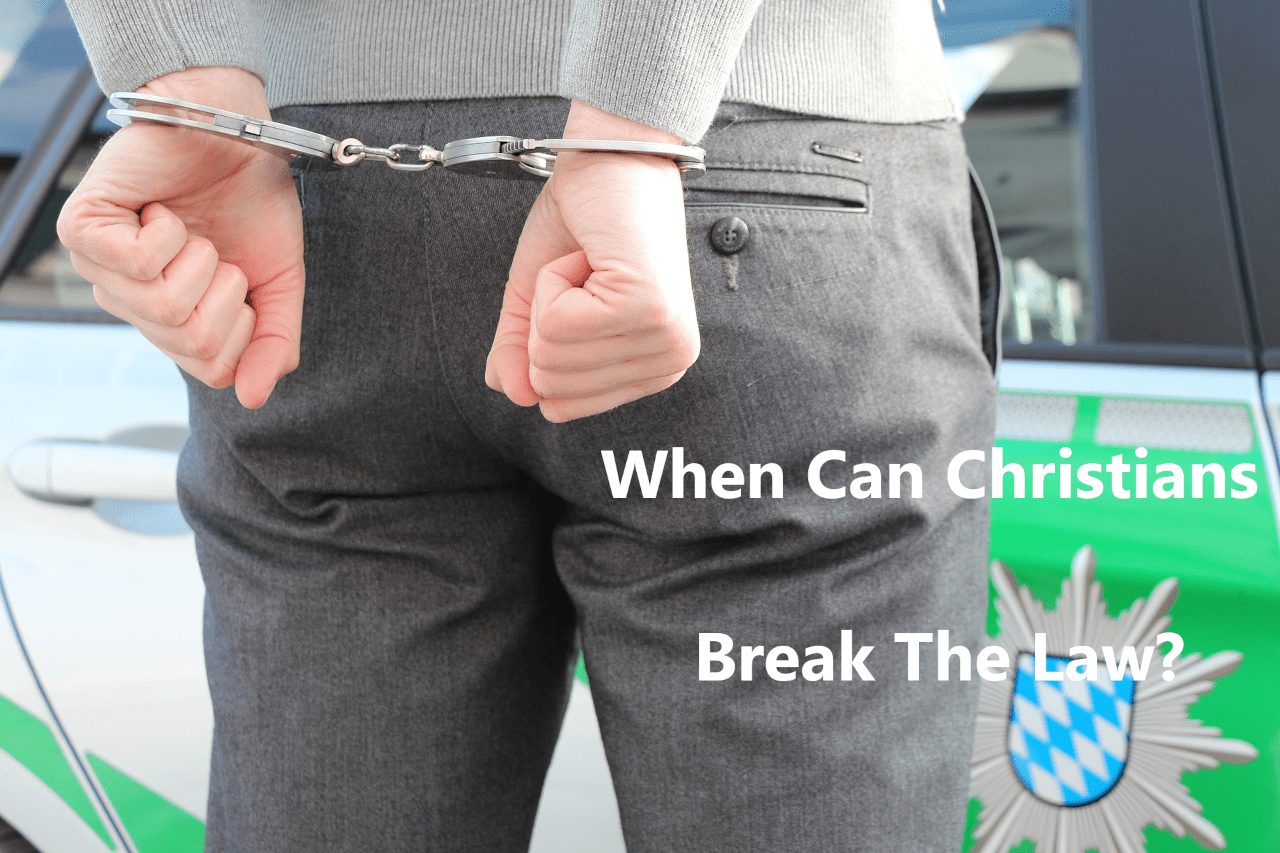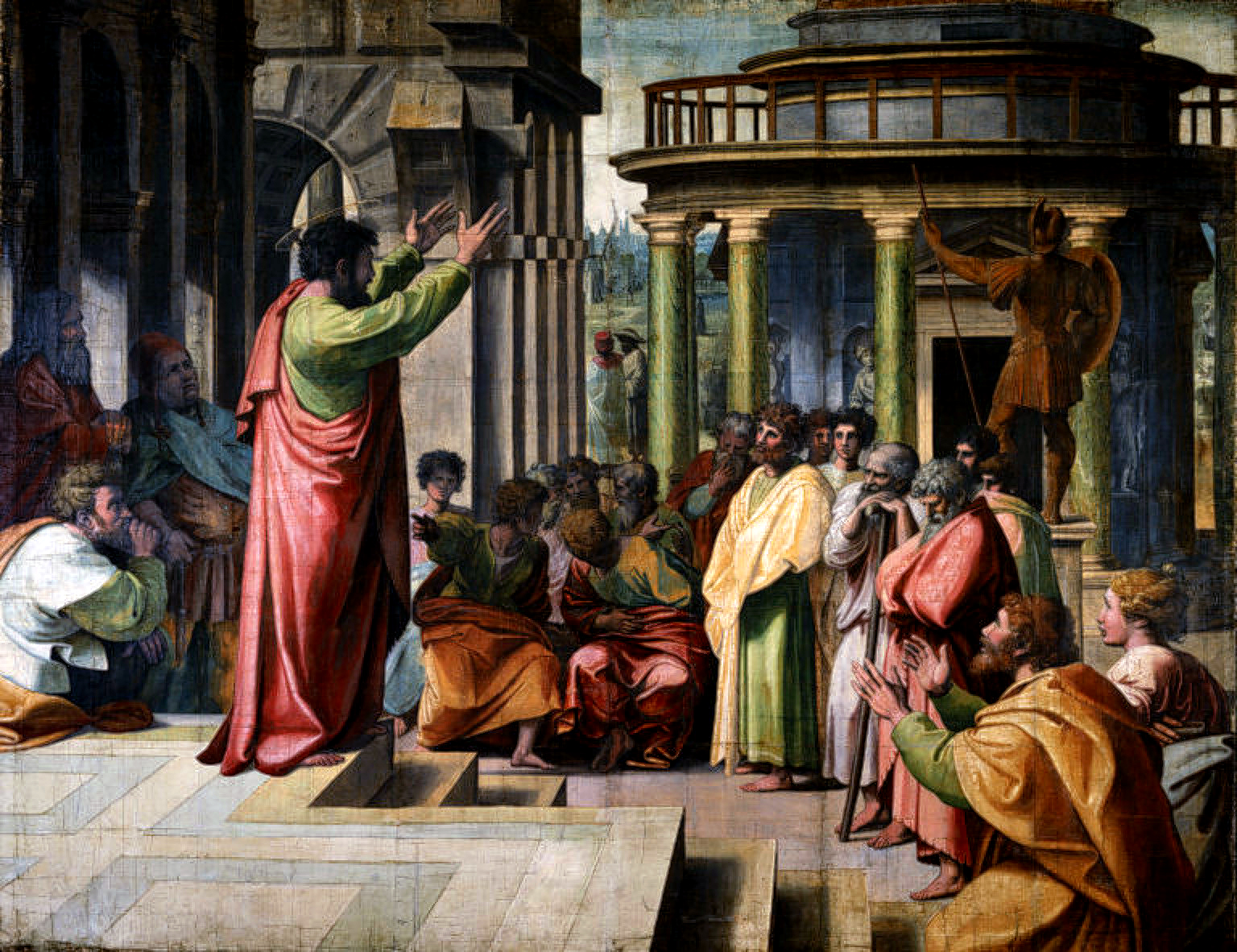Is America A Theocracy?
With the recent overturning of Roe v Wade in America, my social media feeds have been flooded with images calling America a theocracy and saying that the Christians on the Supreme Court are shoving their religion down the throats of Americans. 6 of the 9 Justices are Catholic after all. So is that what happened? Was the decision based on religious conviction? Did the highest court in the land really force their religion on the rest of us? Does the court even have a religion?
What Is A Theocracy?
Before we can determine if the government is a theocracy, we have to first define what a theocracy is. The term “theocracy” comes from Greek and is usually translated as “rule of God”. Josephus often used it in his writing to describe the nations of Judah and Israel where God was the head of the state. In a theocracy, the leader is often described as having a direct connection to the particular diety that is at the head of the government.
There are still a handful of theocracies today. One is Vatican City – headed by the Pope. There is also Mt Athos – a small independent island off the coast of Greece that is run by monks from the Eastern Orthodox church. And, on the Islamic side, there is Afghanistan and Iran whose laws and governments are based on Sharia Law – or Allah’s immutable law – which comes from two of Islam’s holy books (the Quran and the Hadith).
A Quick U.S. Government Refresher/Primer
In the event that someone outside of the US is reading this (or you were like me and completely zoned out in US Government class as a high school senior) let’s give a quick primer on how the US government is structured. The government is made up of 3 branches. The Legislative is made up of The House of Representatives and the Senate. They are in charge of making the laws. The Executive Branch is headed by the President and is in charge of executing the laws. And the Judicial Branch- primarily the Supreme Court – is in charge of making sure the laws of the Constitution are being applied and interpreted correctly. Pretty simple, right?
It is also important to note that the Constitution is based on negative rights and not positive rights. Negative rights start with the assumption that there are certain natural rights granted to individuals outside of the government. Certain things are foundational to humanity and the government promises they won’t take those rights from us. If you read the first few Amendments of the Constitution they all start with “Congress shall make no law that…”. Notice that the rights all start with Congress. That’s important. Remember, it’s the legislative branch (meaning Congress) that makes the laws – not the other two.
With positive rights, the government determines what rights you have. If the government says they will give you the right to speak freely, it’s different than saying you inherently have the right to speak freely and we promise we won’t take that from you. Your rights are given to you based on what rights the elected officials think you should have.
Finally, the Constitution states that the federal government will only handle the things outlined in the Constitution. Everything else will be handled at the state level as each state sees fit.
Religion and The Government
The freedom to practice a religion (or not) was of primary importance to the founding of our nation. There are a few historical documents and phrases that enter into this discussion frequently.
The First Amendment
The First Amendment of the Constitution says this:
Congress shall make no law respecting an establishment of religion, or prohibiting the free exercise thereof; or abridging the freedom of speech, or of the press; or the right of the people peaceably to assemble, and to petition the Government for a redress of grievances.
In other words, the government promises they won’t establish an official religion of the state and they won’t keep its citizens from exercising whatever religion they chose however they want. And, if they don’t want to practice a religion, they don’t have to.
The Separation of Church and State
One phrase that people like to use whenever a hint of religion shows up in a government office or decision is the famous “separation of church and state” phrase. When someone tosses it out, what they usually mean is that the government has said it will be devoid of religion.
Here’s the thing. Separation of church and state is not a phrase that appears anywhere in official government policy. It’s not in the Constitution and it’s not in any law that has come to pass.
So where did the phrase come from? The first version of the phrase was used by Roger Williams, the founder of Rhode Island when he said that there needed to be “a wall or hedge of separation” between the “wilderness of the world” and “the garden of the church.” The first person to use the actual phrase “separation between church and state” was Thomas Jefferson in a letter written in 1802 to the Danburry Baptist association where he assured them that the First Amendment promised a “wall of separation between the church and state.”
In both of these cases, the desire was for the government to keep out of the business of the church; not for the government to be irreligious. Both Williams and the Danburry Baptists wanted to make sure that they (and anyone else) were allowed to worship the way they wanted to and that the government would stay out of it. They weren’t asking the government officials not to practice their own respective belief systems.
Another famous instance where a government official used this phrase was when John F. Kennedy was running for President in 1960. Kennedy was a Catholic. And, there was a concern that – as a Catholic – he would be taking direction from the Pope. The Protestants were concerned that because of the nature of the relationship between Roman Catholics and the Pope, the President would have to do what the Pope told him to do. In a speech that Kennedy gave to the Greater Houston Ministerial Association in 1960, he assured the American people that he would not be controlled by the Pope; nor should he be disqualified from office because of his religious beliefs.
Is America A Theocracy?
Now that we’ve established some definitions, the answer to this question is pretty obvious. No, America is not a theocracy. God is not seated at the top of the political pyramid in the US government.
Do you know what US law would look like if we were under a theocracy? If the government was really forcing religion on anyone (and the religion they are talking about here is Christianity), here are some things that would be federal law.:
- everyone would have to go to church at least once a week
- everyone would have to donate a percentage of their income to the church
- sex before marriage would be a crime
- adultery would be a crime
- dishonoring your parents would be a crime
- having hatred for anyone would be a crime
- lying to anyone would be a crime
Need I go on?
So, why all the theocracy memes? Why all the religious finger-pointing? Well, the “theocracy” one is easy. It’s all hyperbole meant to get an emotional response by using a scary word most people don’t have a clear definition for.
Does the Government Have A Religion?
Now, there is another way in which governments and religions can be joined. This is by the establishment of an official church of the state. To this day, England still has the Church of England (an Anglican denomination) integrated into its governmental structure. And the Parliament can make decisions that affect the church directly. Some of the Bishops of the Church of England also sit in the House of Lords as voting members representing the interests of the church.
The Church of England isn’t as obtrusive in the lives of the English citizens as it used to be. People used to be forced to go to church. And any dissenting beliefs were stamped out. Sometimes violently. Which is why a lot of English settlers came to America in the first place.
The answer to this question is also no. The government most certainly has not established a particular religion for the state to follow.
Look, if there’s one thing that Protestant churches are good at, it’s splintering over the smallest difference. It’s why there are so many denominations. It’s not as simple as making Christianity the official religion of the state; the state would have to pick a denomination. Trust me, every denomination that didn’t get picked as the state church would cry foul and be just as upset as the people who didn’t want a church picked in the first place.
What Did The Decision Do?
At the heart of the Roe vs. Wade debate has been the authority of the court. Does the Constitution provide for the right to have an abortion at the federal level or did the court in 1973 grant the right to something for which there was no law to back it?
The legal discussion is a fascinating one but one I will not get into here. Suffice it to say that the ruling of the Supreme Court determined that the right to have an abortion is not something that can be found in the Constitution. Therefore, it is up to each state to determine the issue for itself.
The legal decision is an easy enough thing to understand. So, why all the protesting? Why all the vitriol? At issue here is that the Supreme Court ruled in a way that a particular side of the abortion issue agrees with. And a very vocal side of the issue does not. So, the name-calling begins (Remember, we talked about ad hominem attacks as a logical fallacy before). Nowhere in the majority opinion does it ever mention anything about a religion or a deity. It’s just page after page after page of legal precedent, prior legal cases, quotes from legal books, etc. Their decision had nothing to do with their religious convictions and everything to do with the original decision of Roe v Wade being a bad one based on current Constitutional law.
The legal discussion on how this all played out is a fascinating one – and one I may discuss in a future article as things progress. But, right now, my point is that the ruling had nothing to do with religion and everything to do with the laws as written.
And here’s the tough pill to swallow. Just because a court decision ends in the same result as the position of a particular group doesn’t mean the court is “pro” that group. The court’s job is to determine how to adjudicate specific cases based on the law that is already written. And, if you read the majority opinion on the case, it never mentions a particular religion. It doesn’t even say that abortion is wrong. The justices just said that abortion isn’t in the Constitution and it wasn’t up to the court to decide.
Now the decision on abortion rights has been given back to us to cast our vote rather than have the decision made for us by 9 individuals whom we didn’t elect.
Now, it’s up to us.
Share This Story, Choose Your Platform!
latest video
news via inbox
Nulla turp dis cursus. Integer liberos euismod pretium faucibua








I would say that this is a very prevalent issue that we face today in America. Thank you for your input on it!
Hi Daniel,
You’re welcome.
Thanks for your comment
while I do not believe that America is a theocracy I question why when the president is inaugurated he has to swear by the bible. And yes maybe religion did influence the Roe v. Wade argument it doesn’t mean that all the past decisions have been influenced by religion. I don’t watch a lot of politics but I do know that nobody can force you to follow their religion simply because they overturned the abortion ruling it doesn’t mean that they did it because they were thinking about their religion at that moment but they were thinking about the new life that wouldn’t be brought into this world. and I won’t really care if you get an abortion or not I mean I’m not you I can’t judge you for the decisions you choose to make, If you want to keep your baby you can keep your baby if you don’t want to then don’t your decisions aren’t affecting outside people who want to make themselves feel affected by YOUR decisions on YOUR body because you are you and nobody is going to be you. So I believe that the U.S. is not a theocracy it just simply a bunch of old people running the government because if it was a theocracy we would. be exactly like you stated in your article and that wouldn’t be fun.
Hi Ashley,
Did you get a chance to read the other articles about abortion. Would love to hear your thoughts on those
Thanks for your comment